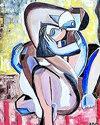From the Mental State of Noise to the New Frontiers of Cognition
IF 0.3
4区 社会学
0 HUMANITIES, MULTIDISCIPLINARY
ANGELAKI-JOURNAL OF THE THEORETICAL HUMANITIES
Pub Date : 2023-05-04
DOI:10.1080/0969725X.2023.2216538
引用次数: 0
Abstract
Subsumed under the category of noise, in the context of Fischer Black’s paper on models for trading in the financial markets, is a range of uncertainties pertaining to economic forecasting, uncertainties about future tastes and developments in technology in this instance, or about irrational expectations. However, in terms of economic models alone, the profundity of Fischer Black’s insight goes well beyond the mere question of their efficiency. What he raises is a fundamental epistemological principle pertaining to all theory: noise is what afflicts our ability to test theories. We owe Fischer Black this stark truth of epistemological, ethical, and, dare I say, metaphysical consequence: because of noise, we are “forced to act largely in the dark” (529). Steven Sands and John Ratey’s article of the same year, “The Concept of Noise,” which we are happy to be able to republish here, can cautiously be credited with having first spelled out the cognitive dimension of the predicament to which Fischer Black points as noise. In this article, Sands, then Clinical Instructor in Psychology at Harvard Medical School, and Ratey, Assistant Professor of Psychiatry at the same institution, propose the “mental state of noise” as a key concept transversal to the nosology or classification of psychiatric illnesses:从噪音的精神状态到认知的新前沿
在Fischer Black关于金融市场交易模型的论文中,噪声类别下的假设是与经济预测有关的一系列不确定性,在这种情况下,未来品味和技术发展的不确定性,或非理性预期的不确定性。然而,仅就经济模型而言,菲舍尔-布莱克的深刻见解远远超出了其效率的问题。他提出的是一个与所有理论相关的基本认识论原则:噪音是折磨我们检验理论能力的因素。我们欠Fischer Black一个认识论、伦理以及形而上学后果的严酷事实:因为噪音,我们“被迫在很大程度上在黑暗中行动”(529)。史蒂文·桑兹(Steven Sands)和约翰·拉蒂(John Ratey)同年的文章《噪音的概念》(the Concept of Noise),我们很高兴能够在这里再版,可以谨慎地认为,它首先阐明了菲舍尔·布莱克(Fischer Black)所指的噪音困境的认知维度。在这篇文章中,时任哈佛医学院心理学临床讲师的Sands和同一机构的精神病学助理教授Ratey提出了“噪音的精神状态”作为一个横向于精神疾病的病因或分类的关键概念:
本文章由计算机程序翻译,如有差异,请以英文原文为准。
求助全文
约1分钟内获得全文
求助全文
来源期刊

ANGELAKI-JOURNAL OF THE THEORETICAL HUMANITIES
HUMANITIES, MULTIDISCIPLINARY-
CiteScore
0.60
自引率
33.30%
发文量
57
期刊介绍:
Angelaki: journal of the theoretical humanities was established in September 1993 to provide an international forum for vanguard work in the theoretical humanities. In itself a contentious category, "theoretical humanities" represents the productive nexus of work in the disciplinary fields of literary criticism and theory, philosophy, and cultural studies. The journal is dedicated to the refreshing of intellectual coordinates, and to the challenging and vivifying process of re-thinking. Angelaki: journal of the theoretical humanities encourages a critical engagement with theory in terms of disciplinary development and intellectual and political usefulness, the inquiry into and articulation of culture.
 求助内容:
求助内容: 应助结果提醒方式:
应助结果提醒方式:


